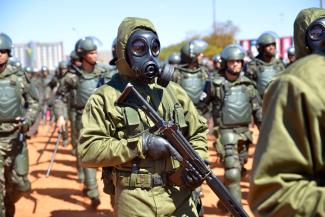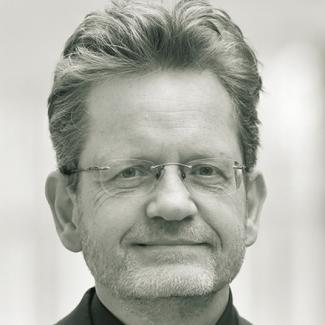Victims of dictatorship
Delayed truth, no justice
 Fehrman/Demotix/picture-alliance
Fehrman/Demotix/picture-alliance
In the first volume of its final report, the National Truth Commission (Comissão Nacional da Verdade – CNV) describes the cruel and historically significant human-rights violations that were committed under the rule of Brazil’s military junta after the coup d’état of 1964. The Commission discusses the bureaucratic structure of the dictatorship, including its many organs of repression. Supporting the extremely powerful national secret service, each ministry ran a secret service of its own. There were also several different police services, which made the systematic abuse of human rights possible.
Furthermore, the Commission sheds light on the close cooperation between the countries of the Southern Cone of South America (Argentina, Brazil, Bolivia, Chile, Paraguay and Uruguay). Starting in 1975, the military regimes of these countries agreed to secretly coordinate their brutal repression in a campaign called “Operation Condor”. The CNV also reports how military officers from Brazil were trained by the US Army School of the Americas.
Four basic human rights violations
The first volume identifies the four most important human rights violations:
- unlawful and arbitrary detentions,
- systematic physical and psychological torture, including rape and sexual assault,
- arbitrary and extrajudicial executions or other types of killings perpetrated by the state and
- enforced disappearances.
The second volume contains contributions by individual members of the Commission, taking stock of human rights violations against specific groups (such as members of the military, workers, farmers, indigenous peoples and homosexuals) and institutions (like universities and the Church). It also illuminates the collaboration between the dictatorship and members of the business community.
The third volume of the report is of particular historical significance. It is dedicated to 434 individual victims, 191 of whom were killed and 243 disappeared. The report narrates the victims’ lives and the circumstances of their deaths. It reveals that Brazil’s military dictatorship pursued an active policy of systematic human rights violations.
The Commission does the right thing by naming names. The 377 suspects it identifies include eight former presidents of the dictatorship, all of whom are dead, as well as ministers of the navy, army and air force. The report also names businesses and entrepreneurs who collaborated with the regime. This process of “naming and shaming” is a classic strategy of transitional justice. It is a first, albeit very cautious step towards coming to terms with the past in a serious way.
The CNV report is based on over 1000 witness statements, which were made in 80 public hearings. Its documentation of the crimes of the dictatorship are an enormous achievement that deserves the highest respect. The CNV has made significant progress towards establishing facts and truth. Individual criminal trials would not have led to the same impressive results. The reason is that a truth commission unites experts from different fields of learning and is in a position to tackle the historical truth. Criminal trials, on the other hand, must focus on whether an accused individual is guilty or not, and the historical context is only taken into the account to the extent needed to settle that question.
It is equally commendable that the report identifies structures that are still in place and create favourable conditions abusing human rights. To improve matters, the Commission’s suggestions include reforming the curriculums of police and military academies in order to promote democracy and human rights. Additionally, the CNV wants the government to repeal legislation that discriminates against homosexuals. It also highlights deficiencies in Brazil’s code of criminal procedure and shortcomings of its law-enforcement agencies.
Commission of impunity
The report also deserves some criticism however. Since the Ministry of Defence and the armed forces did not support the CNV, the report contains little new information. The Ministry of Defence disclosed very few new documents, and the documents it did release mostly contained facts that were already known. Therefore, the report does not provide new insights.
More important, the CNV is likely to remain a commission of impunity. It was formed much too late and ultimately failed to overcome the greatest obstacle: the amnesty law of 28 August 1979. This law is standing in the way of the comprehensive criminal prosecution of the perpetrators of Brazil’s human- rights violations. The amnesty law has never been seriously called into question, despite the fact that the current president, Dilma Rousseff, and her predecessors Lula da Silva and Fernando Henrique Cardoso were all victims of the dictatorship.
The armed forces continue to refuse to officially acknowledge that human-rights violations took place. Some members of the military have even gone so far as to refer to the coup of 1964 as a “revolution”. They wanted the CNV to investigate crimes committed by the opponents of the military regime. Military leaders even attempted to use legal means to prevent the report from being disseminated.
The Commission report is obviously putting some political pressure on the Brazilian justice system and the Supreme Court (Supremo Tribunal Federal – STF). The people who are suspected of committing human rights abuses should finally face criminal prosecution, sentences and punishment. The report uncovers serious violations that constitute crimes against humanity. International law requires that such crimes be prosecuted and punished, however, and a national amnesty law cannot undo this obligation.
The CNV does recommend that the amnesty law be repealed. However, that recommendation will probably not be heeded because Brazil’s Supreme Court has declared that the law is constitutional. It has thwarted efforts by the federal prosecution service and some federal judges to take perpetrators to court.
The Inter-American Court of Human Rights (Corte Interamericana de Derechos Humanos – CIDH), however, supports the Commission’s point of view. According to a CIDH judgment of October 2014, Brazil is not fulfilling its obligations under international law to prosecute human-rights violators. The important thing now is how new STF justices will view this question.
Nevertheless, it is surprising that the CNV’s report does not recommend carrying out the usual, internationally recognised measures of transitional justice, such as cleansing the public sector of people with connections to the former regime for instance. In Brazil, retired members of the military and others who were involved in human rights abuses continue to get state pensions and benefits without being subjected to criminal prosecution.
The CNV has many recommendations for Brazil (see box). But its approach seems rather half-hearted, since it does not even demand that all tools of transitional justice be used. It is not clear that the CNV had a mandate to propose broad reforms. As a result, its suggestions come across as arbitrary and incomplete.
Generally speaking, however, the Commission’s report is laudable. It could go a long way towards changing Brazil’s authoritarian mentality and strengthening its democratic institutions. The fact that the report includes the demand to prohibit celebrations of the 1964 coup shows that authoritarian thinking is quite persistent.
The CNV’s report strikes a heavy blow against those who harbour nostalgia for the dictatorship and against inveterate defenders of torture. Nevertheless, the members of the military who perpetrated crimes and those who supported them in the administration have yet to be taken to account. The armed forces, moreover, still badly need structural reform. Delayed truth is better than no truth, and late justice is better than no justice.
Kai Ambos is a professor of international criminal law at Göttingen University and a judge at Landgericht Göttingen (delegated to Oberlandesgericht Braunschweig).
kambos@gwdg.de
Eneas Romero is a public prosecutor from Brazil and preparing his PhD thesis at Göttingen University with a DAAD/CAPES scholarship.
Links:
Final report by the Comissão Nacional da Verdade (CNV):
http://www.cnv.gov.br/index.php?option=com_content&view=article&id=571
Judgment by the Corte Interamericana de Derechos Humanos:
http://www.corteidh.or.cr/docs/supervisiones/gomes_17_10_14.pdf
Judgment by the Supremo Tribunal Federal:
http://www.stf.jus.br/arquivo/cms/noticianoticiastf/anexo/adpf153.pdf


